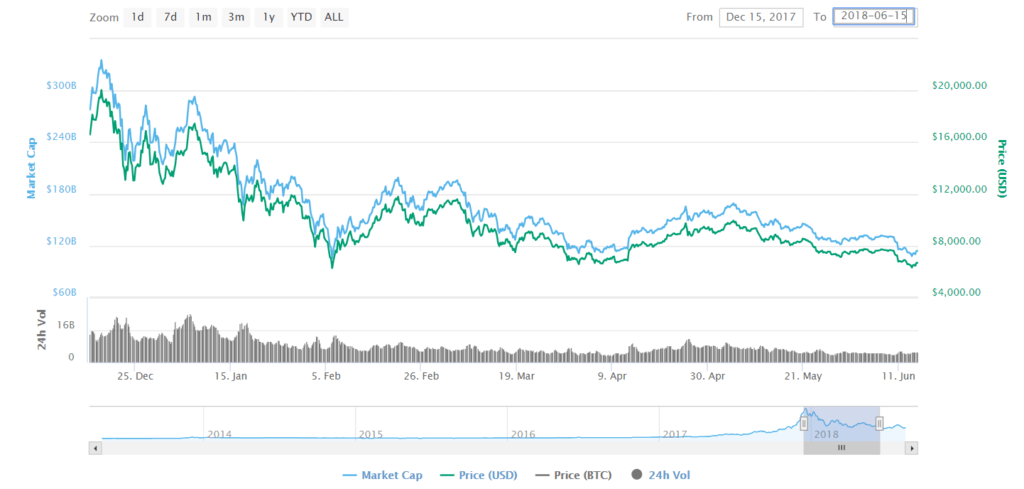The first and probably most important is whether or not you have trading experience in other markets, like the equity or Forex markets. Secondly, what you are planning to hold as your base currency, BTC, ETH or USD, etc? Also, what kind of time can you devote to trading on a daily or weekly basis?
All these factors will affect the outcome and answer to this question.
Experience Vs. Luck
As a general answer, let me start by saying that most “pundits” who have made relatively good returns off Bitcoin trading have done so in what is referred to as a bull market. That means the market, for a prolonged length of time, has been trending upwards. During these periods, nearly anyone can make money trading Bitcoin or any asset class. If the price, tomorrow, will be more than the price today, the average investor can make money with little to no market understanding.
For the 100’s of YouTubers who claim to have made small fortunes trading Bitcoin, this was the case, as the overall markets enjoyed an upward trend for the majority of 2017.
Since mid-December, however, this trend has been turning the other way. We are currently (from Dec-July) in what is called a “bear market”, referring to the current down-trend of the overall sector. Taking a look at the graph below, you can clearly see this downward trajectory over the last 180-day period.
During these times, a person who lacks market experience and knowledge will likely lose money and not be able to generate a return. Professional traders, however, will. That is because they can use more advanced trading techniques like “short selling” to make money even when a market is falling.
Additionally, while a day trader can buy low and sell high in a bull market, during a bear market, those patterns usually result in a succession of lower peaks and bigger dips. This makes it impossible for the average trader who is not properly trained to make money and they may actually lose more than if they had simply held through the fall.
Choosing a Base Currency
The second part to this is what you are planning to keep as a reserve currency? If you are attempting to grow your USD value, for example, then in a bull market it is very possible as the value of BTC continues to increase against the dollar. In a bear market, it would be a tall order to accomplish, as the value is decreasing against the dollar. That being said, if you were simply trying to increase the amount of Bitcoin you have during these downtrends, that would be a lot easier.
For example, if you had sold BTC at an uptick for Ethereum, and Ethereum was to lose value against BTC, you could go back and forth increasing your BTC holdings as the market dropped. This is because, though they both are dropping in value against the USD, they will not drop at the exact same rate on the way down.
In the case of Ethereum and Bitcoin, for example, as BTC falls, Ethereum usually falls faster and rises faster. So, during a downtrend, Ethereum would be converted to BTC, and during an uptrend, it would be converted back to Ethereum.
This is by no means a guarantee and I have seen the market do the opposite as well. However, if you could identify this discrepancy, you could essentially increase your BTC or ETH positions. In both cases, however, you will have less USD in coin value. When the market turns bullish, you will have a lot more of either currency and will profit immensely.
The Time it Takes to Actually Trade and Makes a Profit
The final part is how much time can you devote to trading? Unlike conventional markets that usually have limited trading hours and weekends off, the cryptocurrency markets are 24/7, 365 days with no days off. If you can only spend a few hours a day trading, many times you will find the opportunities going back and forth between currencies will be missed. Additionally, not being around during flash crashes or panic sells, or not taking profits when markets reach resistance levels, will mean you may make nothing.
Trading is about being around to take advantage of these market conditions, and if you don’t have the time to do so, it will likely be better to simply put your money in when the market is bullish and trade sparingly. Professional traders also spend countless hours working on these strategies and doing market research to identify opportunities.
If you have a surplus of time, enough capital that profits can cover that time (your expenses), and you’re willing to work, learn and evolve, you can make decent money trading Bitcoin.
Defining Your Strategy
You will also need to identify what your overall strategy is. Are you going to try and make profits in fiat? Or are you looking to increase BTC holdings because you believe BTC will be worth more in the long run? I also strongly suggest educating yourself on financial
markets and the technology that is behind cryptocurrencies.
Another key – and a huge part of deciding your strategy – is to keep up-to-date on rules, regulations, sector news, and whatever else may affect the markets and increase volatility. CoinBeat is a great place to get that information, as we aim to deliver those details directly to our readers and put them ahead of the informational curve.
If you can put those things into play, you can make a decent return and live trading cryptocurrencies like Bitcoin. If you can’t, however, I would suggest not trying to do something you are not equipped or capable of doing on a professional level.
For example, though it is possible for anyone to cook a meal, it is not possible for everyone to devote the time and energy required to run a successful restaurant. Hence why we have professional cooks. Similarly, trading Bitcoin, a professional trader can make 100’s of percent over the market’s general movements as they trade based on the volatility of the markets. If the swings in a single day are more, they make more.
In the above chart, for example, if a trader had cashed out at every peak and bought back in at every dip, they would have made a very tidy profit even in a falling market. That, however, would have taken a strong understanding of market signals, intuition that can only be gained by actively trading, and a knowledge of where resistance and support levels within the market were.
Where to Get Help
While not everyone has the ability, skills, time, or resources to devote to trading at that level, professionals do exist that can help guide you in the right direction. CoinBeat, for example, is a publication that connects investors with professional traders, analysts, researchers, and industry insiders.
Using CoinBeat as a primary informational resource, an investor can copy or mimic positions of professional traders, tapping into their knowledge base and skill set. Using it, you may find that you can make more and learn from professional traders as to how they position their trades and maximize profits while minimizing risks. To join these professionals and tap into their knowledge and expertise, make sure to subscribe and join the CoinBeat community.
In short, trading Bitcoin can be highly profitable if done correctly. If not, you will potentially lose a lot more than just hodling (holding) your BTC for the long run








Comments